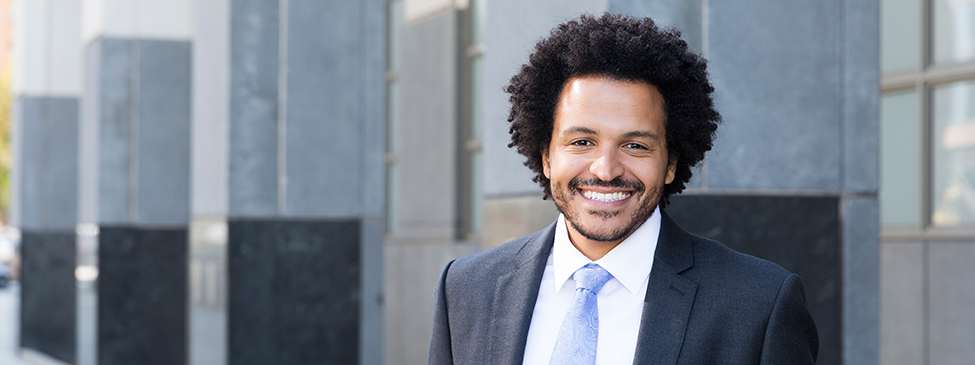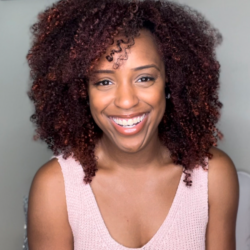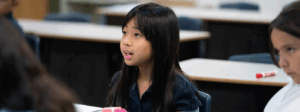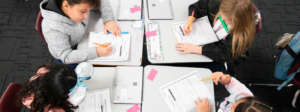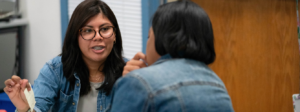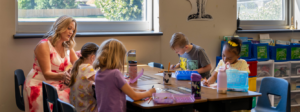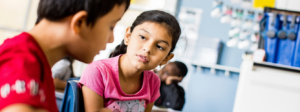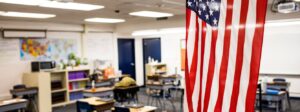As a young boy growing up in Brockton, Massachusetts, Jonathan Santos Silva was certain he would grow to be at least six feet tall and become a professional wrestler. Today, he’s about 5’8” on a good day and has built a career in a much different kind of arena.
“Never in a million years, did I imagine that this kid from Brockton would be living out his dream in South Dakota,” says Jonathan. “Never ever.”
And he doesn’t just live in South Dakota. Before pursuing his Master’s in Education Administration at the University of South Dakota, he taught math here. Since graduating, he has helped support Indigenous school leaders in launching and transforming schools that would better serve Indigenous youth in Pine Ridge, Rosebud, and Standing Rock. Alongside his wife, who is also an educator, he is raising his children here. As a 2019 TNTP Bridge Fellow, he has spent the last year challenging the educational status quo, championing equity and high standards for Indigenous students.
Now that his fellowship has come to an end, he is continuing his service to South Dakota, building a transformational leadership institute that prepares culturally responsive educators—The Liber Institute.
“Our name, which is named after the Roman God Liber, means ‘the free one,’” the former founding head of a school explains. “It’s a direct reflection of our vision, which is to collaborate and liberate ourselves from tired models of schools that were not designed to serve us. When we do this well and with communities in the lead, we are the free ones.”
It’s now widely acknowledged that Native education in the U.S. was inspired by harmful philosophies and designed to erase Indigenous values and ways of life. Native schools have too often relied on curricula that don’t affirm Indigenous history and culture, and on educators who are ill-prepared to meet Indigenous students’ unique learning needs. As a result, academic achievement among Indigenous students is among the lowest of any demographic group. Through the Liber Institute, Jonathan hopes to bring students, families, and communities together to disrupt this cycle of educational inequity—and bring greater focus to the educational needs of a group that’s rarely talked about.
“The sad reality is that when we think about opportunity gaps or schools that want to improve but don’t have the resources, we rarely talk about schools Indigenous youth attend—especially on reservations,” he says. “As an African American man, I appreciate that we talk about schools where Black students are, where Latinx students are, and where immigrant populations concentrate. But Indigenous kids are just as creative, intelligent, amazing, and talented as kids anywhere else, and there is no acceptable reason why they are often a forgotten part of the conversation.”
The Liber Institute will help strengthen the quality of teaching and leadership in Indigenous schools, and partner with Indigenous communities to help reimagine their schools’ cultural and instructional practices. It will organize its work into three interconnected parts: a culturally responsive teaching fellowship for teachers, transformational leadership coaching for school leaders, and a “liberatory” design lab focused on unearthing and producing local approaches to building more equitable schools and institutions.
Jonathan says his time as a Bridge Fellow has helped prepare him to keep advancing the work to which he’s so deeply committed. “Through many conversations, observations and experiences, TNTP has taught me the importance of transparency in leadership,” Jonathan says. “I’ve learned it’s ok to not get things right the first time as long as you never stop challenging yourself to improve and grow.”
With the Liber Institute officially underway, Jonathan is filled with dreams and excitement for what the future holds.
“Seeing communities engaged as true partners in school leadership— that’s the goal,” says Jonathan. “That means participation in decision-making on macro and micro issues, not just an invitation to the back-to-school barbecue. It means more adults in school that look like the children being served, including certified teachers, volunteering family members, and invited guests. It looks like those teachers who do not reflect students sharing in the community’s vision of high expectations supported by love for each child, and a commitment to creating the conditions for all students to thrive.”
“This commitment to constant improvement is what our kids and our communities deserve. Thanks to my time at TNTP and the relationships I’ve fostered, I walk into this new chapter confident that I’m ready to help embolden local educators, students, and families to be architects of a true transformation. That’s way more fulfilling than getting hit with steel chairs.”
For more information on the Liber Institute, visit http://theliberinstitute.org/
